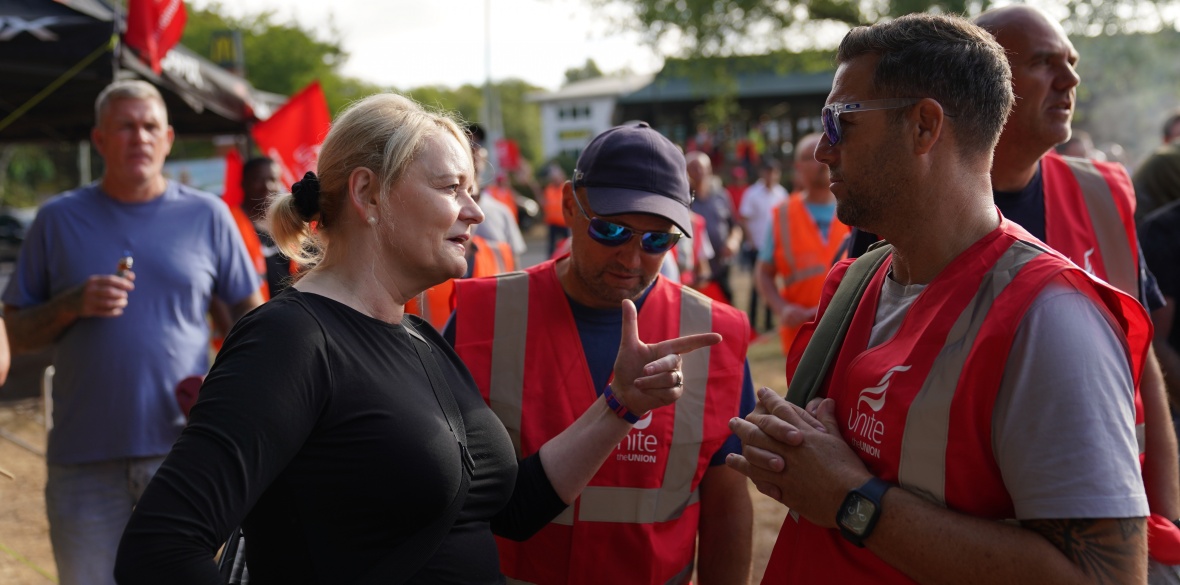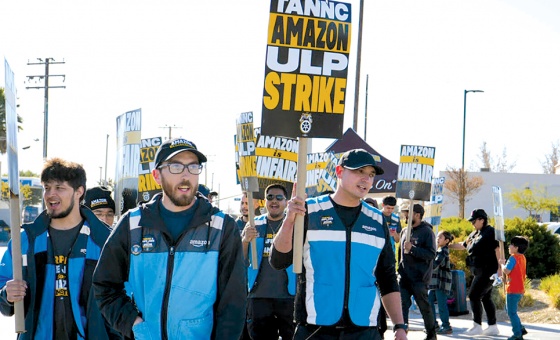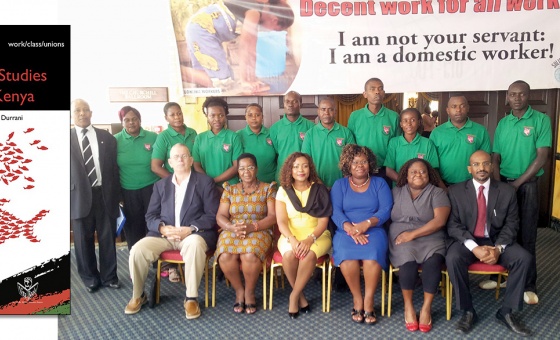This is the last article you can read this month
You can read more article this month
You can read more articles this month
Sorry your limit is up for this month
Reset on:
Please help support the Morning Star by subscribing here
“WE’RE at a ‘which side are you on?’ moment for the labour movement. That’s not being bullish. That’s just reality.”
Unite leader Sharon Graham sees nothing new in Liz Truss’s attempts to attack public services to enrich the richest.
“It’s the policy they’ve been peddling, frankly, for at least the last 10,11 years. This trickle-down economics, rich get richer, poor get poorer — it’s not new. It’s just now on steroids.
“There’s no point in having Truss’s bigger pie if the same people are dividing it. We are taking our piece of the pie because they won’t give us our piece.
“The problem we have with the economy at the moment is it’s broken. And there’s a narrative out there that wages are driving inflation, that workers have to tighten their belts, all the stuff we heard in 2008 by the way after the crash, when workers paid the price through austerity for 10 years.”
Unite has taken the lead in demolishing that narrative, identifying the role of rising profit margins in driving inflation.
“Because we've got forensic accountants to back up our negotiations, I knew that there were huge profits in these companies. So when we did the profiteering report it changed the narrative, because it was showing that the FTSE 350’s 73 per cent uplift in profit margins since just before the pandemic.”
Behind the “rebirth of the trade union movement,” as Graham characterises the rise in militancy and spread of industrial action this year, is the experience of the pandemic.
“It has created a mood shift. It showed what we’d known for a long time, that workers always pay the price, that they’re the ones who are sent out to deal with the unknown, and often low-paid — obviously in the NHS, but also in the bins, the dock workers were out there — all these workers …
“And then those exact same workers are told, well, take a pay cut.
“I think ordinary women and men look at that and go, ‘something’s not right’.”
And the other key factor in the spread of strikes is that nothing succeeds like success.
“We are winning dispute after dispute. We’ve had 451 disputes already this year. There’s another 100 in the process of balloting.
“We are winning because we are doing strikes, yes — but we’re also doing what’s called ‘strikes plus.’
“Strikes are a critical part of it, nothing will ever be as important as strikes. But there is also assistance to those strikes, which is what I call the leverage strategy, where we’ve been able to do both together. It’s really important that we use brains and brawn.”
Unite has become adept at identifying where the money is in companies — not always straightforward given this can be hidden behind multiple subsidiaries or contractors — and targeting the real decision-makers.
It’s working. “Of those 451 disputes we’ve won 81 per cent. You don’t win everything, that’s not life, but you’ve got to win more than you lose. We’ve won 81 per cent and put £200 million back into the pockets of workers — that’s up £50 million since the last time we spoke.
“I’m waking up every morning, the reps are waking up every morning, the officers are waking up every morning thinking: ‘How can we win?’
“So I think we’re winning more not just because of the tight labour market, of course that puts workers in a more powerful position, but they are winning more because we are planning better and we are bringing other things to the table.”
Such as greater co-ordination. Unite organises across 41 sectors of the economy and has thousands of agreements with separate employers across 38,000 workplaces.
“So we’re co-ordinating those sector by sector at the moment, whether that being bringing the reps together in transport or on the docks, the combine strategy, looking at the anniversary dates of pay, how can we co-ordinate. Yes, there’s anti-trade union legislation, but we have to find ways to be able to win. It’s our job.”
Unite has put forward a motion on co-ordinating action to the TUC this week. It will be key to successes in the public sector — will the same leverage tactics be applicable there, where we’re not talking about a profiteering employer but a nationalised public service like the NHS?
“Well, I wish it was all nationalised! We’ve got lots of private companies in there albeit they are paid by the state.
“But we’ve done it before — in a previous life there was a huge issue in the Yorkshire Ambulance Service” (back in 2013-14).
“It’s the same thing. Who are the decision-makers, how do you move the decision-makers.”
That might not be a management board but politicians. Graham recalls the campaign to exclude the NHS from the threatened Transatlantic Trade and Investment Partnership between the EU and United States.
“That was people in communities getting their MPs to vote in a particular way.
“There’s a lot of scope within the public sector for ‘strikes plus.’
Coventry Council, for example, was a ‘strikes plus’ campaign, there were parts of it that were about following the money.
“There are revenue streams, and there are hurdles they have to jump to like the Care Quality Commission, so it’s about understanding that and how we can get into the middle of that and apply the pressure to get the workers a pay rise.”
While Graham makes no apology for her relentless focus on pay — “my job is to get more money in members’ pockets” — the union is also campaigning on issues like public ownership, preparing a paper on nationalising the energy sector for example, and is alive to regional moves towards municipal buses.
“We’ve got to convince workers, they’re not pawns in this, those whose jobs are there, that this is the way to go.
“But we can argue that it’s much better if we organise the sector this way — better for society, and better for the workers. That’s part of what the combines do — it looks at the here and now on co-ordinating pay but also at the next five or 10 years, what should we be doing to secure this industry, secure those jobs and protect terms and conditions in the long term, and nationalisation is part of that conversation.”
Public opinion has proved broadly sympathetic to striking workers — but the Tory response is to vow ever more draconian anti-union legislation.
“If this government really wanted more money in workers’ hands it wouldn’t be trying to attack trade unions.
“This government does not want more money in the hands of workers — it wants less.
“It’s no coincidence that they are attacking us now, when we are winning.”
Despite the turmoil in Tory ranks, Graham doesn’t think an election is imminent — “turkeys won’t vote for Christmas” — and expects them to unite around the anti-union agenda.
“We can’t be victims. We’ve been putting more and more money into our £50 million strike fund, more money on the front line to mobilise to beat thresholds. Do everything we can to jump those hurdles.”
As for Labour, which has distanced itself from striking workers, “I think they’re missing a huge opportunity.
“People can see this is the last defence of trade unions, and people are supportive of strikes. And Labour talk like being on a picket line is being on the naughty step.
“Obviously I prefer a Labour government to a Tory government, but if Labour don’t do the right thing we will be a thorn in their side.”
That’s why Unite has launched Unite for a Workers’ Economy, a project currently operating in 10 “red wall” seats promoting the different kind of economy workers need.
“This is about a deep-fabric mobilisation of the places that we, unions, have vacated. It’s not a platform for politicians.
“We need to drive politics, not just comment on it. This is about giving ownership and tools to local communities for them to raise their issues. Politicians follow, they don’t lead.
“We are going to be permanently in these communities, driving these issues — say occupational pensions linked to pensioner poverty, food poverty, low wages, the NHS — and whoever wants to get the vote in those communities needs to pick those issues up.
“There will be mobilisations, there will be collective actions, but we need to build, we’ve got to get out and talk to people of every political tradition and none. You can’t do that if you start top down.”
What does she hope for from the TUC? “Confidence, co-ordination and a clear plan.
“I’m trying to build for a five, 10-year programme — how will the unions be much stronger in 10 years?
“We’re moving the motion on co-ordination of action. I’m moving it. That’s going to be real.”

 Ben Chacko
Ben Chacko










